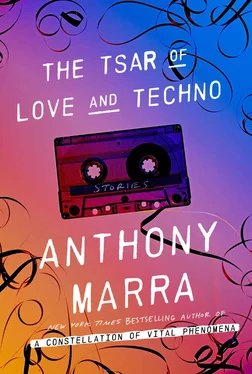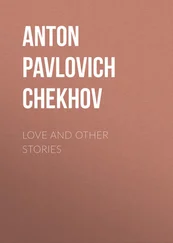“What are you doing?” she asked. Dance was supposed to be choreographed, rehearsed, and sterilized until its most trivial imperfections had been obliterated along with any vestigial joy, and performed to silent, judgmental audiences. It wasn’t spontaneous. It was never fun. “This is a march,” she stammered. “You don’t waltz to a march.”
“I don’t even know what a waltz is,” Kolya breezed, breaking his a cappella rendition long enough to spin Galina in small circles, dipping her until her hair swished against the gravel. She wanted to weep but she laughed. She joined in when he reprised the march. This feeling of rightness, of belonging-to-ness, it wasn’t an idea or a word, but an absence of ideas and words, an airiness where blood and bone had been, right out to her weightless fingers, safely fastened within his in case she floated away.
The Twelve Apostles spouted golden pillars. Shadows widened beyond wedges of electric light.
Kolya entered the chorus with an orchestra of punch-drunk madmen living in him, belting the tune to the velvet yellow, to the misting lake, to the carcinogens no song could dislodge from his capillaries, and in this amphitheater of decimated industry, on this stage of ice and steel, he taught the granddaughter of a prima ballerina to dance.
AROUND the same time, I fell into a different kind of love. It began when our father sent us to a warehouse across town to conduct a little business for him. Yes, it might have been crime but it certainly wasn’t organized. Besides, in Kirovsk the line between crime and business is as slender as an orphan’s forearm.
My chilled breath grew and vanished like a unicorn’s horn continually poached from my face.
We slogged through a twilight town banked with snow so high the first floors of buildings were their third stories. No street signs or addresses marked that side of the city — a ploy, Kolya claimed, to confuse invading Yankee armies — and we walked for what felt like hours before we heard the music: thunderous drums, shimmering melodies, a bass loud enough to put the beat back in a stopped heart. Around the corner, BMWs idled at the curb, languorous Nordic swans stretched their limber necks, lips tightened on fancy cigarettes, lizard-skin shoes, golden chains, men’s shirts stitched of siren light, yawning pupils, noses in their glory days between rhinoplasty and cocaine collapse, nymphs dressed in diamonds large enough to fund Third World civil wars, tasteful neon signage hummed over the entranceway: DANCE PARTY PLACE!
A line stretched halfway down the block, but Kolya wrapped his arm around my neck, and we jostled to the front. The bouncer had the flattened, scarred face of a well-loved anvil. He glared at our muddy shoes with little admiration. But Kolya could sweet-talk the deaf, and within moments the bouncer had ushered us inside. How to describe the paradise within? In a word, women. The dance floor awash in steel-tipped heels, leather boots gripping sweat-slick calves, skirts small enough to seal inside an envelope. Fake lashes, nails, and breasts that collectively enlarged reality to normalize their obscene dimensions. Coin-thick cosmetics. Flesh coruscating in strobe light with the depilated iridescence of deep-sea invertebrates. Our flat-faced Virgil led us through the swelling sea of bodies, but I wanted to drown, die, live forever, there is no difference, within the sequined sound.
In a shadow-dampened room behind the DJ booth, Kolya spoke with a ladder of a man whose vermillion suit jacket sat on his shoulders as if still on the hanger. His greased, blond, butter-cleaved hair stood at attention, and I could tell from the way he held his cigarette that he could commit murder on his way to dinner and still have enough appetite to order dessert.
He handed us a brown attaché case and dismissed us with a quick flick of his cigarette. We duckling-waddled behind the bouncer as he left the room.
“Can you introduce me to a woman?” I asked him.
“Which one?”
Let’s be honest: It didn’t matter. The heat-seeking desire flowing from my heart via my south-lands was indiscriminate in its aim. A woman needed only acknowledge my existence to become the love of my life. I was twelve years old.
“Her.” I pointed vaguely to the crowd.
He buckled with laughter. He had to clasp my shoulder to keep himself from falling. I was no more than a serf allowed to glimpse the Winter Palace ballroom before being shoved into the open arms of the communal night. But beneath it all, the bouncer was a deep and empathetic soul. Before he escorted us to the exit by our elbows, he grabbed a black mixtape from the DJ booth and stuffed it in my sagging coat pocket.
The next morning I woke to the sharp scent of vinegar — my father had long been an amateur pickler — and wondered if the previous night had been a mirage baked in slumber. But there, right beside me, on the rickety nightstand, the mixtape soaked in a pool of honeyed daylight.
Kolya was still asleep. I dove beneath his bed and rooted through his library of sexual congress: peach-flesh magazines for every perversion, lusty paperbacks, bodies clothed only in unmarked VHS cases, stalagmites of used tissue, unsent love letters to Galina, and, floating on that sordid sea, a tiny one-shot-size vodka bottle filled with my mother’s ashes, which he’d stolen from the jar-urn right after the funeral to save some small part of her from the Black Sea. I unearthed and flung it all behind me until I found his cassette player.
For waking him at that unholy hour, he walloped me with his boot, the first in a migrating flock of projectiles aimed at me over the course of the next few minutes. I sat in bed, facing the wall with my blanket sprawled tent-like over me, locked in the stereophonic groove, oblivious to the storm breaking over my back.
For the rest of my adolescence, the visions promised by DANCE PARTY PLACE! and other dance party places formed the bank into which I deposited the loose change of dreams. The headphones, volume cranked to ten, formed a cocoon nothing could pierce: not Kolya’s bullying, not my father’s deepening depression, not even my mother’s memory, which could sharpen suddenly at the sight of soapsuds, and leave me impaled on sorrow. As if I could just die for the length of a track, slipping into sweet oblivion as my heart took a rest and the bass circulated my blood. I surrendered to the Dictatorship of Dance, the Supreme Soviet of Sound.
I jury-rigged two ancient gramophones into turntables that flaked green gunk in time with the drums. Mixtapes and LPs from Moscow, Petersburg, and Minsk flooded through the post, and alone in my room, I studied track lists like a techno-loving Tatyana Larina. Due to my lacking status and surplus acne, I couldn’t hope to pass the face control of a place like DANCE PARTY PLACE! , so I tried crappy discos, basement raves, summer field sets, bad scenes, worse scenes, scenes where contact highs were unavoidable, where you felt way more liquid than solid, where you’d enter a free soul and leave eight hours later having exchanged your shoelaces and short-term memory for bruises on your knees, elbows, and stomach that no one could properly explain. I waited outside the finer venues, bumming cigarettes from DJs and club kids on break. Cigarettes were all I asked for, but they gave me so much more: spare change (sometimes they thought I was a vagrant), the last spittly sips of shared vodka, the mobile numbers of drug dealers and petty criminals, conversations that conveyed the illusion that I was a peripheral star in their cosmos.
Sometime around then, I started making mixtapes of my own.
7
I said good-bye to Galina, hung up the phone, and re-bubble-wrapped the Zakharov before the urgency knifing into my back lost its point. I packed it in the duffel along with a half-dozen mixtapes, my Walkman, toiletries. On further inspection, I added a pair of socks, lucky blue underwear, and a secondhand Speedo.
Читать дальше












